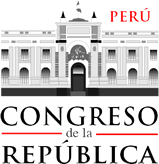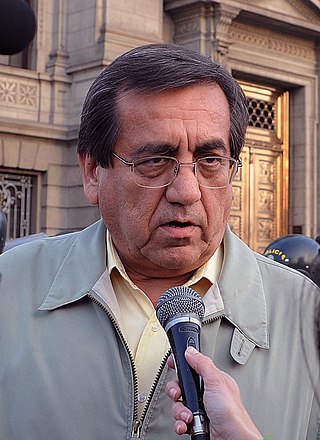
Óscar Raymundo Benavides Larrea was a Peruvian field marshal, diplomat, and politician who served as the 38th and 42nd President of Peru.

Manuel Carlos Prado y Ugarteche was a banker who served twice as President of Peru. Son of former president Mariano Ignacio Prado, he was born in Lima and served as the nation's 43rd and 46th President. His brother, Leoncio Prado Gutiérrez, was a military hero who died in 1883, six years before Manuel Prado was born.

Chile holds nationwide presidential, parliamentary, regional and municipal elections.

The Constitution of the Bolivarian Republic of Venezuela is the current and twenty-sixth constitution of Venezuela. It was drafted in mid-1999 by a constituent assembly that had been created by popular referendum. Adopted in December 1999, it replaced the 1961 Constitution, the longest-serving in Venezuelan history. It was primarily promoted by then President of Venezuela Hugo Chávez and thereafter received strong backing from diverse sectors, including figures involved in promulgating the 1961 constitution such as Luis Miquilena and Carlos Andrés Pérez. Chávez and his followers (chavistas) refer to the 1999 document as the "Constitución Bolivariana" because they assert that it is ideologically descended from the thinking and political philosophy of Simón Bolívar and Bolivarianism. Since the creation of the Constituent National Assembly in August 2017, the Bolivarian government has declared the 1999 constitution suspended until a new constitution is created.

Romania elects on a national level a head of state – the president – and a legislature. The president is elected for a five-year term by the people. The Romanian Parliament has two chambers. The Chamber of Deputies has currently 330 members, elected for a four-year term by party-list proportional representation on closed lists. The Senate has currently 136 members, elected for a four-year term by party-list proportional representation on closed lists.
Elections in the Philippines are of several types. The president, vice-president, and the senators are elected for a six-year term, while the members of the House of Representatives, governors, vice-governors, members of the Sangguniang Panlalawigan, mayors, vice-mayors, members of the Sangguniang Panlungsod/members of the Sangguniang Bayan, barangay officials, and the members of the Sangguniang Kabataan are elected to serve for a three-year term.

The Congress of the Republic of Peru is the unicameral body that assumes legislative power in Peru.

The Constitution of Peru is the supreme law of Peru. The current constitution, enacted on 31 December 1993, is Peru's fifth in the 20th century and replaced the 1979 Constitution. The Constitution was drafted by the Democratic Constituent Congress that was convened by President Alberto Fujimori during the Peruvian Constitutional Crisis of 1992 that followed his 1992 dissolution of Congress, was promulgated on 29 December 1993. A Democratic Constitutional Congress (CCD) was elected in 1992, and the final text was approved in a 1993 referendum.

Jorge Alfonso Alejandro Del Castillo Gálvez is a Peruvian lawyer and politician. In his career, he has served in the now abolished Peruvian Chamber of Deputies between 1990 and 1992, in the unicameral Congress of the Republic for six non-consecutive terms, between 1995 and 2011 and again from 2016 to 2019, five of which are consecutive terms, and as Mayor of Lima and the District of Barranco during the 1980s.

A constitutional referendum on electoral reform was held in Turkey on 21 October 2007. After the aborted attempt to elect the next president in May 2007, the government of Recep Tayyip Erdoğan introduced substantial electoral reforms in parliament which were then passed with the votes of Erdoğan's Justice and Development Party and the opposition Motherland Party.
{{sidebar with collapsible lists | name = Politics of Colombia | namestyle = background:#00843D; | style = width:22.0em; border: 4px double #d69d36; background:#FFFFFF; | bodyclass = vcard hlist | pretitle= This article is part of a series on the | title = Politics of
Colombia

Carlos Manuel de Céspedes y Quesada was a Cuban writer, politician, diplomat, and President of Cuba.

The Congress of People's Deputies of the Russian SFSR and since 1991 Congress of People's Deputies of the Russian Federation was the supreme government institution in the Russian SFSR and in the Russian Federation from 16 May 1990 to 21 September 1993. Elected on 4 March 1990 for a period of five years, it was dissolved by presidential decree during the Russian constitutional crisis of 1993 and ended de facto when the Russian White House was attacked on 4 October 1993. The Congress played an important role in some of the most important events in the history of Russia during this period, such as the declaration of independence of Russia from the USSR, the rise of Boris Yeltsin, and economic reforms.

A constitutional referendum was held in Peru on 25 August 1919. The proposed reforms were approved by voters.
An Icelandic Constitutional Council (Stjórnlagaráð) for the purpose of reviewing the Constitution of the Republic was appointed by a resolution of Althingi, the Icelandic parliament, on 24 March 2011. Elections were held to create a Constitutional Assembly (Stjórnlagaþing) body, but given some electoral flaws, had been ruled null and void by the Supreme Court of Iceland on 25 January 2011, leading the parliament to place most of the winning candidates into a Constitutional Council with similar mission. The question of whether the text of the proposed constitution should form a base for a future constitution was put to a non-binding referendum, where it won the approval of 67% of voters. However, the government's term finished before the reform bill could be passed, and the next government has not acted upon it.

A constitutional referendum was held in Armenia on 6 December 2015. Its amendments to the constitution put the country on a course from having a semi-presidential system to being a parliamentary republic, with the changes beginning to take place during the 2017–18 electoral cycle. The referendum passed with 66.2% of voters supporting it. Voter turnout was 50.8%, passing the 33% threshold to validate the results.

The National Board of Justice, formerly the National Council of the Magistrature, is an autonomous constitutional institution that is part of the Republic of Peru. Its primary function is to appoint and ratify all judges and prosecutors in the Peruvian justice system as well as to remove those that fail to fulfill their responsibilities.

The 2019–2020 Peruvian constitutional crisis began when President Martín Vizcarra dissolved the Congress of Peru on 30 September 2019 considering a de facto denial of the vote of confidence. Congress responded by declaring Vizcarra's presidency suspended and appointed Vice President Mercedes Aráoz as interim president, moves that were largely seen as null and void.

General elections were held in Peru on 11 October 1936. In the presidential election, Luis A. Eguiguren of the Social Democratic Party appeared to be heading for victory, but outgoing president Óscar R. Benavides ordered the count to be stopped and the election results were subsequently annulled.















